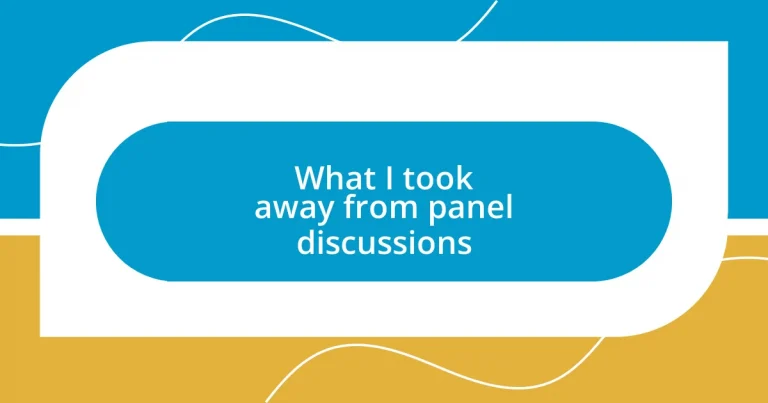Key takeaways:
- Panels facilitate diverse perspectives and foster dialogue, enhancing understanding and sparking innovative solutions.
- Active participation, clear focus, and respect for diverse viewpoints are essential themes that drive effective discussions.
- Sharing knowledge with others reinforces comprehension, fosters collaboration, and can lead to new relationships and initiatives.
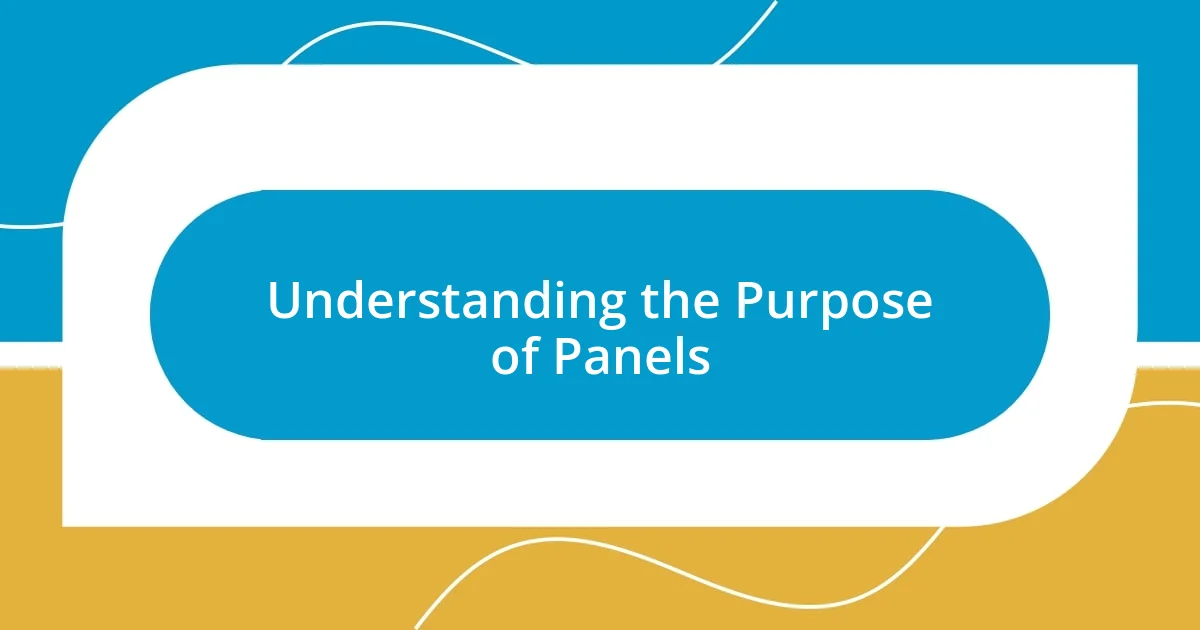
Understanding the Purpose of Panels
Panels serve as a vibrant intersection of diverse ideas and perspectives. I remember attending a panel on sustainability where experts from different backgrounds shared their unique insights. This experience opened my eyes to how various disciplines can approach the same issue, enriching the conversation and sparking innovative solutions.
When I reflect on the purpose of panels, I often think about their role in fostering dialogue. Have you ever felt a particular buzz in the air when differing opinions clash? It’s that energy that makes a panel discussion invaluable. It creates an environment where audience members can not only learn but also engage critically, pushing their own understanding further.
Moreover, panels often highlight the importance of community and collaboration. I once witnessed a panel discussion that transformed into a brainstorming session, with audience members contributing ideas that the experts hadn’t considered. It was a powerful moment, illustrating how everyone’s voice can influence the outcome. Isn’t it rewarding to see how collective knowledge grows when people come together?
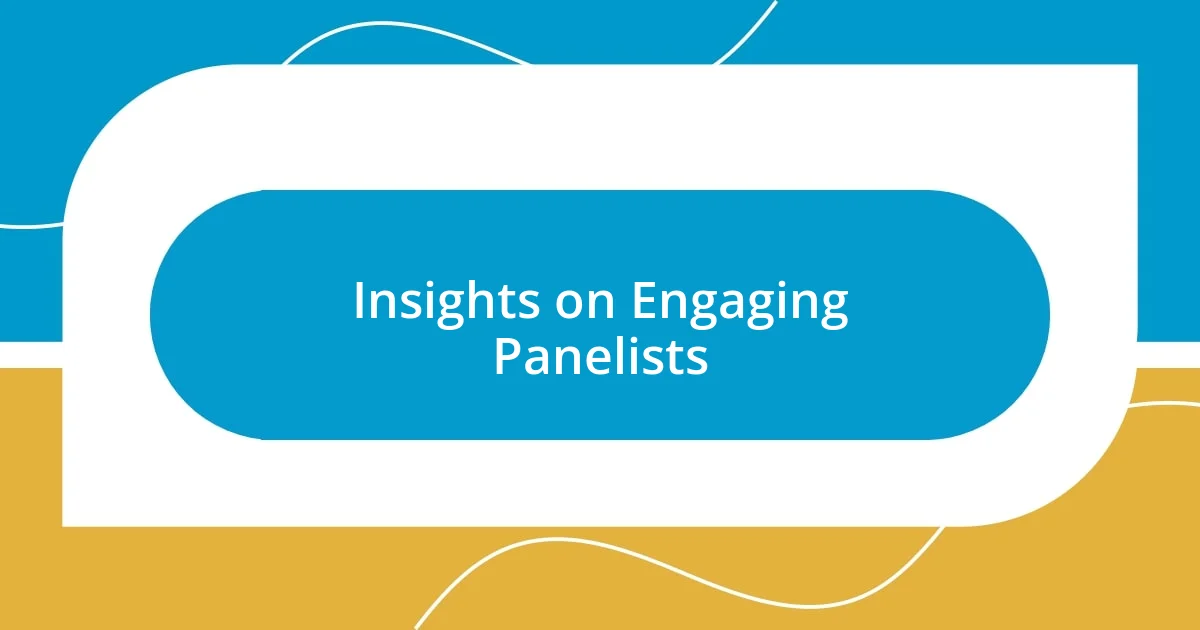
Insights on Engaging Panelists
Engaging panelists is crucial for a lively discussion. I recall a panel where the moderator skillfully prompted speakers with open-ended questions, which ignited an unexpected debate. This approach not only kept the conversation dynamic but also encouraged the panelists to share deeper insights. I’ve learned that the right questions can transform a good discussion into a memorable one.
Here are some effective strategies that have worked for me in engaging panelists:
- Tailored Questions: Address panelists with questions that resonate with their expertise, encouraging them to share personal experiences.
- Active Listening: A moderator who listens intently can interject with follow-up questions that create organic connections between panelists.
- Inclusive Atmosphere: Ensuring every panelist feels valued encourages them to participate openly and share diverse viewpoints.
- Body Language: Positive body language from both the moderator and the audience creates an environment where panelists feel supported and motivated to speak.
- Encouraging Storytelling: Prompting panelists to share personal anecdotes can humanize the discussion and forge a deeper connection with the audience.
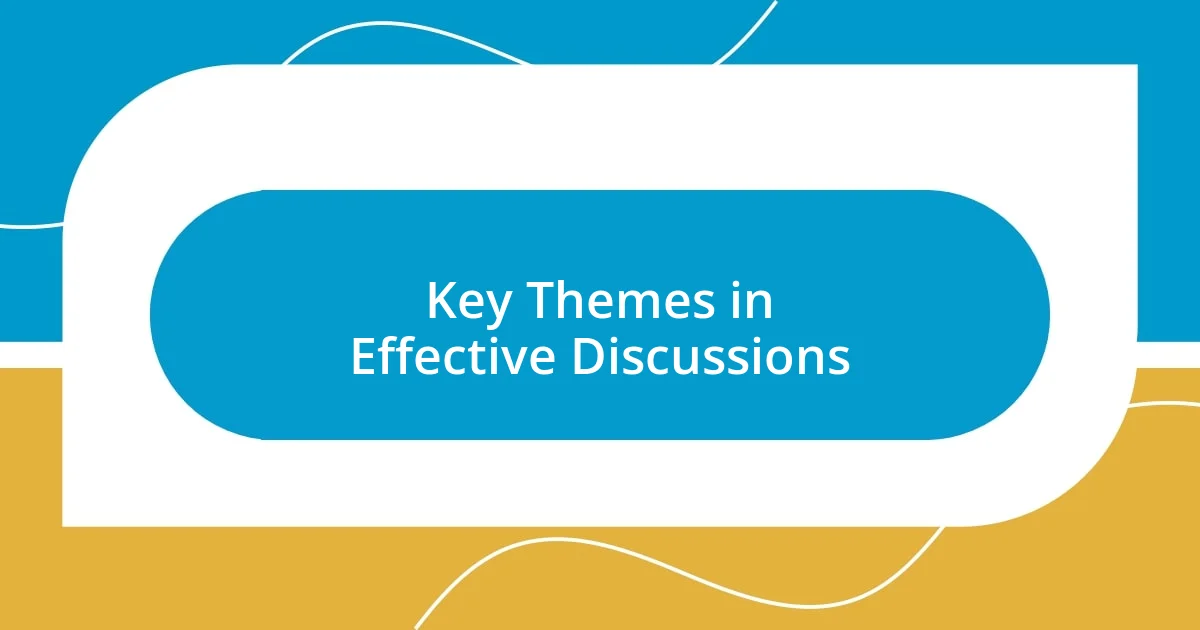
Key Themes in Effective Discussions
For effective discussions, key themes often emerge that significantly shape the overall experience. One vital aspect is the role of active participation. I remember sitting in a session where participants voiced their thoughts freely. Their willingness to share opinions created an electrifying atmosphere, making everyone feel involved and valued. Without that kind of engagement, discussions can fade into mere presentations.
Another critical theme revolves around the importance of a clear focus. During a memorable panel, I noticed how a well-defined topic allowed the conversation to flow smoothly, keeping everyone on the same page. It struck me that having a clear objective guides panelists and participants alike, making the discussion far more productive. Isn’t it interesting how clarity can enhance collaboration?
Lastly, fostering respect among varying viewpoints is paramount for any effective discussion. I recall a moment when a panelist respectfully disagreed with another, sparking a rich dialogue that delved deeper into the subject. It highlighted how embracing diverse opinions enriches the conversation, leading to greater understanding for all involved. Every perspective contributes to a broader picture, and I truly believe that respect is the glue that holds these discussions together.
| Key Themes | Description |
|---|---|
| Active Participation | Encourages involvement and creates an engaging atmosphere. |
| Clear Focus | Guides conversation effectively around a well-defined topic. |
| Respect for Diverse Viewpoints | Embraces differing opinions for a richer dialogue. |
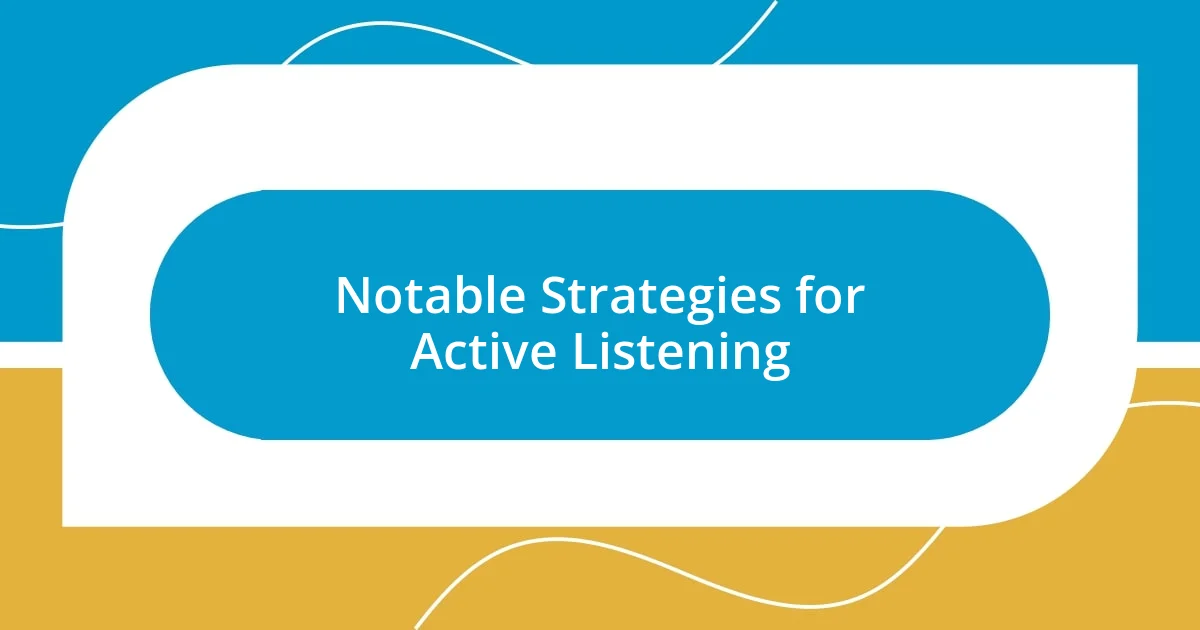
Notable Strategies for Active Listening
Active listening is an art that can transform any panel discussion. I’ve experienced the difference it makes firsthand when a moderator fully engages with the panelists. I recall one instance where the moderator not only listened but mirrored some of the panelists’ expressions, which created a sense of empathy and relief among the speakers. It’s fascinating how such small gestures can coax out more heartfelt contributions.
One strategy that stands out is summarizing what a speaker has just said before moving forward. I remember a discussion where the moderator adeptly recapped a panelist’s points—this not only validated the speaker’s ideas but also prompted further elaboration. It made me wonder how often we miss this opportunity to clarify and build on what’s been shared, and I believe it significantly enriches the dialogue.
Another notable technique involves asking clarifying questions. At one panel, I witnessed a simple “Can you explain that further?” prompt lead to a profound revelation about the topic at hand. This kind of questioning not only deepens understanding but also demonstrates that active listening is about curiosity and connection. It’s the little moments like these that stick with you and enhance the overall quality of the discussion. How often do we take the time to truly delve into a topic, and what might we discover if we did?
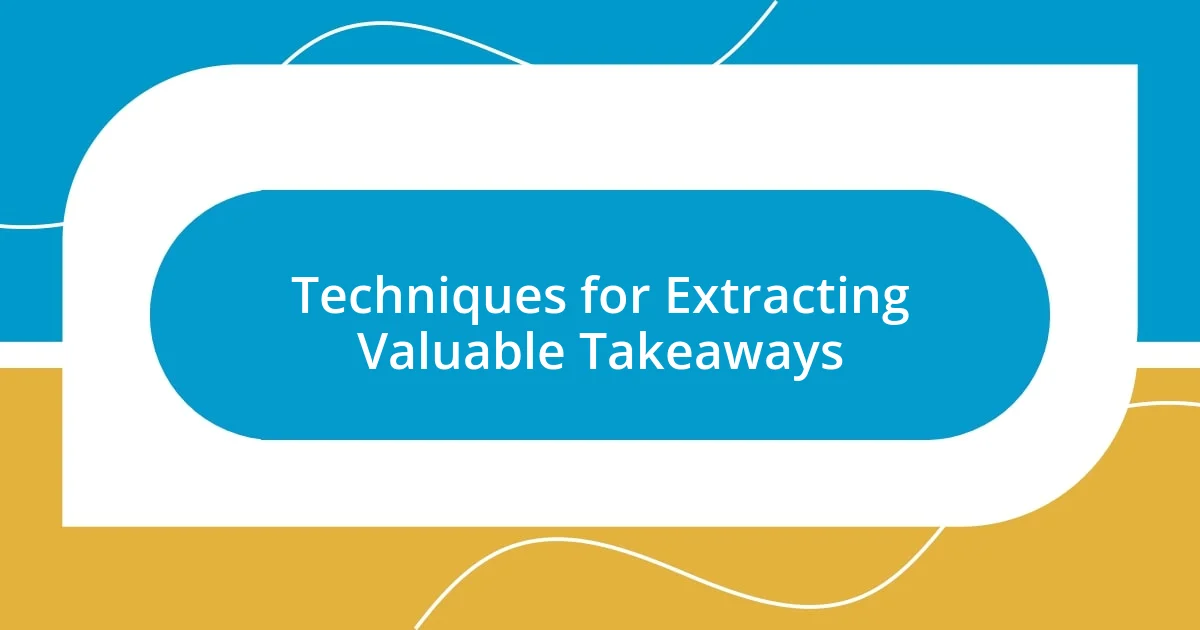
Techniques for Extracting Valuable Takeaways
One effective technique for extracting valuable takeaways is the practice of note-taking. When I attend a panel discussion, I often jot down key phrases or ideas that resonate with me. During one particularly inspiring session, I scribbled notes not just about what was being said, but also about how the ideas made me feel. This method helped me connect emotionally, ensuring that those takeaways lingered long after the event. Have you ever noticed how the physical act of writing something down can reinforce its importance in your mind?
Another strategy I find beneficial is the art of reflection after each session. Taking a few moments to pause and think about what I’ve just heard allows me to digest the information more thoughtfully. I remember leaving a panel on innovation and spending a quiet moment in a café to ponder the insights shared. It was transformative, as I realized the relevance of the discussions to my own experiences. How often do we rush away without giving ourselves space to really process the information?
Lastly, engaging with fellow attendees can significantly enhance the takeaway experience. I vividly recall a post-discussion chat I had with a stranger about a provocative idea presented during a session. Sharing our perspectives not only deepened my understanding but also sparked new insights I hadn’t considered before. Isn’t it fascinating how collaborative learning can multiply our takeaways?
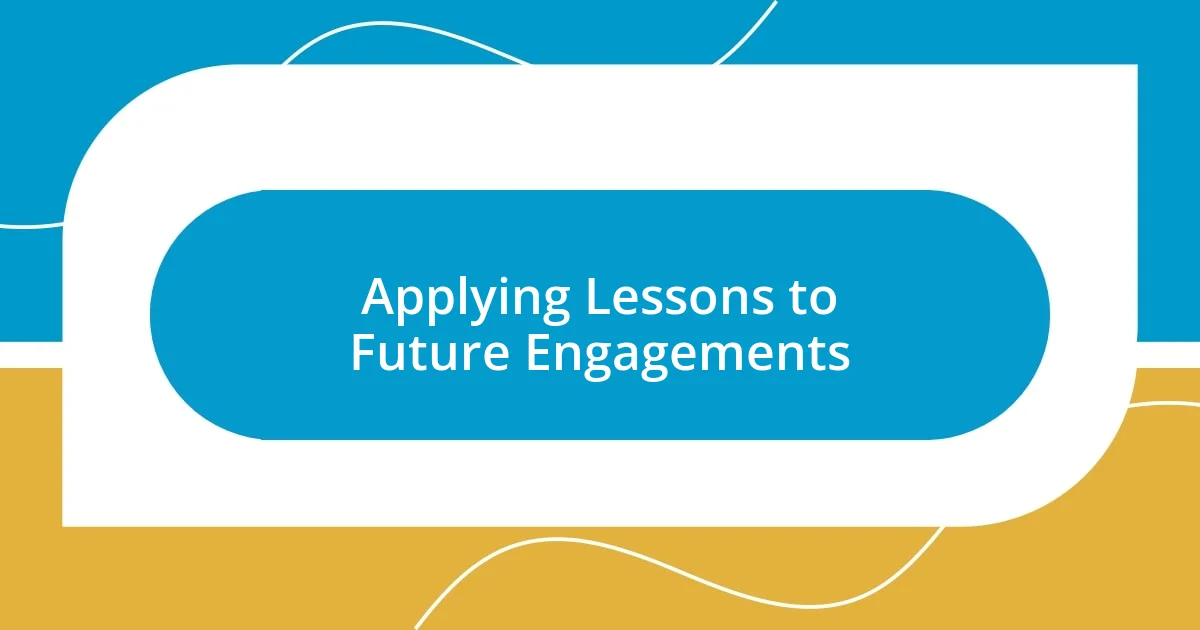
Applying Lessons to Future Engagements
I believe one of the most powerful ways to apply lessons from panel discussions is by actively incorporating insights into my future engagements. For instance, after attending a panel on sustainability, I felt inspired to implement some of the speakers’ ideas into a community project. I remember gathering friends to brainstorm how we could reduce waste in our local area, and that moment of collective action grounded the discussions I had just heard. Isn’t it fascinating how certain conversations can propel you into real-world solutions?
Another approach I’ve found effective is sharing takeaways with my professional network. I often summarize insights from panels during team meetings or casual catch-ups. One time, I shared a compelling statistic about renewable energy gained from a panel, and this sparked a larger conversation that led to new initiatives within our team. It made me think: how often do we miss opportunities to ignite change by simply sharing knowledge?
Lastly, I might incorporate lessons into my personal development journey. After one eye-opening panel about mental health, I began practicing mindfulness techniques discussed by the speakers. It wasn’t just about the session; it was about how I internalized the experience and made tangible changes in my daily routine. How many of us take actionable steps to reflect on what we’ve learned, transforming insights into habits? It’s a small, but critical shift that can significantly enhance our engagement with the world around us.
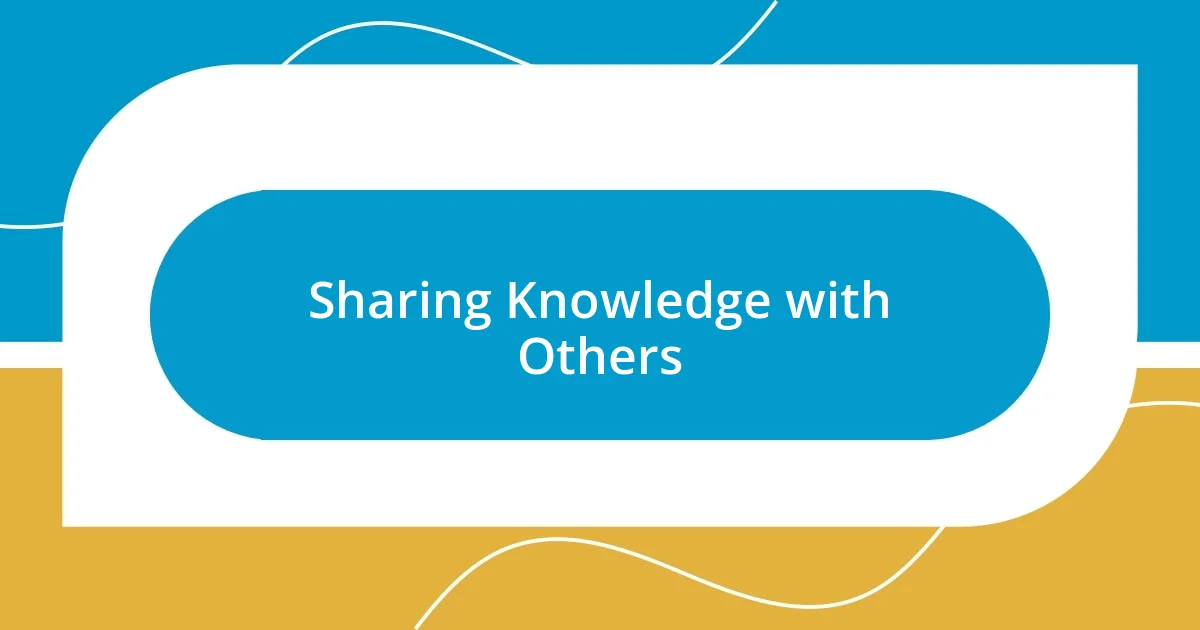
Sharing Knowledge with Others
Sharing knowledge with others is a powerful experience that can create ripples of understanding and innovation. I’ve always felt that nothing solidifies my own grasp of a topic quite like communicating it to someone else. For example, during a recent panel on digital transformation, I found myself explaining key concepts to a friend over coffee. The moment I saw their eyes light up with understanding, I felt a surge of joy—it was as if I were rediscovering the insights through their fresh perspective. Have you ever noticed how discussing ideas can deepen your own comprehension?
One of my favorite experiences was when I organized a small gathering after attending a panel on community engagement. I invited a few colleagues and we dove into discussions about our respective takeaways. As we shared our interpretations, I felt a unique blend of excitement and accountability; the ideas became more alive and actionable. This practice not only reinforced my memories of the panel but also fostered a sense of camaraderie and collaborative learning. Isn’t it incredible how sharing can transform abstract ideas into concrete actions?
In my experience, sharing knowledge also opens doors to unexpected relationships. I once met someone at a networking event who had attended the same panel as I did. As we exchanged thoughts on a specific speaker’s recommendation, we discovered a mutual passion for mentorship. That simple conversation blossomed into a fruitful collaboration, where we pooled our knowledge to create workshops for aspiring professionals. I often wonder: how many connections go untapped because we hesitate to share what we’ve learned? The truth is, every insight could potentially lead to a meaningful relationship or project.












